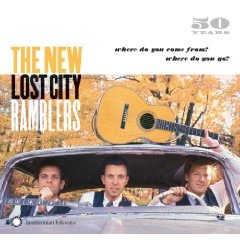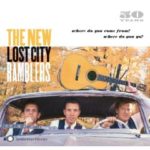Smithsonian Folkways
History lessons aren’t an easy sell. People who are in the mood to gather information or are curious about the topic might sit still, but it takes effort to absorb it all.
The New Lost City Ramblers were top representatives of the authenticity wing of the ‘50s/’60s folk revival. They made few concessions to the mainstream, and spent much time inspecting old 78s and taking field trips to locate undiscovered musical trails of the early 20th century. Still, each track on this three-disc retrospective has an attractive melody, a dramatic story or an amusing yarn to offer, and (especially with the detailed annotation on hand) there is a lot of history to gather here.
The first two CDs of this set (previously released in the ’90s) document the two Ramblers lineups, one featuring Mike Seeger (half-brother of Pete), Tom Paley and John Cohen and the other including Paley’s 1963 replacement Tracy Schwarz. However, the third CD is an especially enlightening ride, combining a few band tracks with samples of some of their ancestors and a selection of musicians discovered and recorded by the Ramblers. This allows the listener to hear some of the rural masters who inspired the Ramblers’ musical quest, as well as meeting other folk-revival figures like Elizabeth Cotten and Reverend Gary Davis. It follows a path from pre-WWII Library of Congress recordings to a couple of string band selections from the early-70’s Bay Area.
With the Ramblers’ takes on such songs as “How Can A Poor Man Stand Such Times And Live?” and “No Depression” present, the roots of future explorers like Dylan, Cooder, Springsteen and Tweedy are easy to glimpse. The Grateful Dead connections in “Don’t Let Your Deal Go Down” and “The Lady Of Carlisle” are also self-evident. One can also detect some parallels with the more recent jamband wave – instrumentals like “Dallas Rag” and “Colored Aristocracy” show that quite a few generations have found entertainment in navigating stringed instruments with speed, and the absurdist strains of a few lyrics, particularly Cohen’s deadpan outings, foreshadow Phish’s “Contact” and “Weigh.” As well, the third disc has many stories of the Ramblers venturing into unknown territory with tape recorders in tow to document the American musical experience, a trek that many successors would repeat, although often they’d be bound for arenas rather than obscure cabins.
Where Did You Come From? may be a history lesson, but it’s edifying and entertaining in a way that few others this year are likely to equal. With Mike Seeger’s recent passing, the lesson is also well-timed.




No Comments comments associated with this post